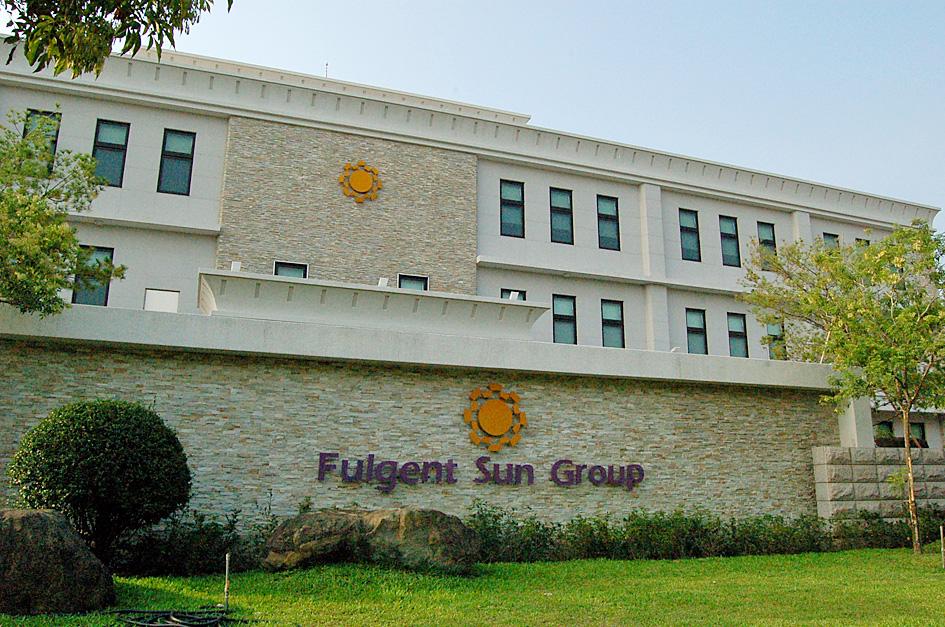Fulgent Sun International Holding Co (鈺齊國際) on Thursday reported increased sales and net profit for the fourth quarter of last year, thanks to robust orders, larger manufacturing capacity, improved production efficiency and better financial controls.
The supplier of global brand sports shoes and functional outdoor shoes said that net profit for the quarter hit a record high of NT$388.31 million (US$14.02 million), up 107.8 percent from NT$186.88 million a year earlier.
Earnings per share were NT$2.09, up from NT$1.01 a year earlier, it said.

Photo: Liao Shu-ling, Taipei Times
Sales for the quarter were NT$4.498 billion, up 51 percent from a year earlier, while gross margin for the three months was 19.1 percent compared with 20.2 percent the previous year, the company said.
“Although gross margin in the fourth quarter was lower than a year before, it rose by 1.3 percentage points from 17.8 percent in the third quarter, and much higher than the 14.4 percent in the second quarter, when the company’s operations were deeply affected by the COVID-19 pandemic,” Fulgent Sun said in a statement.
Better expense controls led to an operating margin increase of 1.8 percentage points quarter-on-quarter to 11.5 percent in the fourth quarter, the highest of last year, it said.
Fulgent’s headquarters are in Yunlin County’s Douliou City (斗六), with seven production bases overseas — three in China, three in Vietnam and one in Cambodia.
Last year, operations in Vietnam accounted for 50 percent of output, with China reporting 31.1 percent and Cambodia 18.9 percent.
As with many of its peers, the company was forced to stop production at its overseas operations last year due to COVID-19 outbreaks, first in Cambodia in May, and then in Vietnam from June to July.
“The impact of the pandemic on manufacturing last year was far greater than in 2020,” Fulgent said.
However, with flexible responses and accelerated expansion of production capacity, the company reported record revenue of NT$15.54 billion for last year, increasing 37 percent from NT$11.35 billion in 2020.
Net profit for the year was NT$1.18 billion, the second-highest in the company’s history and up 32.3 percent from NT$897.58 million in 2020, it said, adding that earnings per share were NT$6.39, compared with NT$5.06 a year earlier.
Gross margin and operating margin for the year fell to 18 percent and 9.5 percent respectively, from 21 percent and 11.2 percent a year earlier due to unfavorable foreign exchange rates.
Fulgent said that it has 50 brand clients, with 10 brands accounting for about 80 percent of its revenue last year.
The company said it would continue developing new customers in the coming year after last year adding clients such as Columbia Sportswear Co, Callaway Golf Co and its subsidiary Cuater, Alfa Sko AS and On Inc, maker of the Run on Clouds brand.
European markets comprised 48.2 percent of Fulgent’s sales last year, with 40.9 percent in North America, the company said, adding that it expects growth to continue as orders for spring and summer shoes are robust.

Sweeping policy changes under US Secretary of Health and Human Services Robert F. Kennedy Jr are having a chilling effect on vaccine makers as anti-vaccine rhetoric has turned into concrete changes in inoculation schedules and recommendations, investors and executives said. The administration of US President Donald Trump has in the past year upended vaccine recommendations, with the country last month ending its longstanding guidance that all children receive inoculations against flu, hepatitis A and other diseases. The unprecedented changes have led to diminished vaccine usage, hurt the investment case for some biotechs, and created a drag that would likely dent revenues and

Global semiconductor stocks advanced yesterday, as comments by Nvidia Corp chief executive officer Jensen Huang (黃仁勳) at Davos, Switzerland, helped reinforce investor enthusiasm for artificial intelligence (AI). Samsung Electronics Co gained as much as 5 percent to an all-time high, helping drive South Korea’s benchmark KOSPI above 5,000 for the first time. That came after the Philadelphia Semiconductor Index rose more than 3 percent to a fresh record on Wednesday, with a boost from Nvidia. The gains came amid broad risk-on trade after US President Donald Trump withdrew his threat of tariffs on some European nations over backing for Greenland. Huang further

HSBC Bank Taiwan Ltd (匯豐台灣商銀) and the Taiwan High Prosecutors Office recently signed a memorandum of understanding (MOU) to enhance cooperation on the suspicious transaction analysis mechanism. This landmark agreement makes HSBC the first foreign bank in Taiwan to establish such a partnership with the High Prosecutors Office, underscoring its commitment to active anti-fraud initiatives, financial inclusion, and the “Treating Customers Fairly” principle. Through this deep public-private collaboration, both parties aim to co-create a secure financial ecosystem via early warning detection and precise fraud prevention technologies. At the signing ceremony, HSBC Taiwan CEO and head of banking Adam Chen (陳志堅)

Intel Corp shares plunged as much as 14 percent in late trading after chief executive officer Lip-Bu Tan (陳立武) gave a lackluster forecast and warned that the chipmaker was struggling with manufacturing problems. First-quarter projections for revenue and earnings fell well short of Wall Street estimates and a conference call with analysts, in which Tan said it would take “time and resolve” to turn around the company, sent the shares down further. Production snags have hampered the comeback bid, a disappointment for investors who anticipated more of a boost from new products. “We are on the multiyear journey,” Tan said. Intel, the largest maker